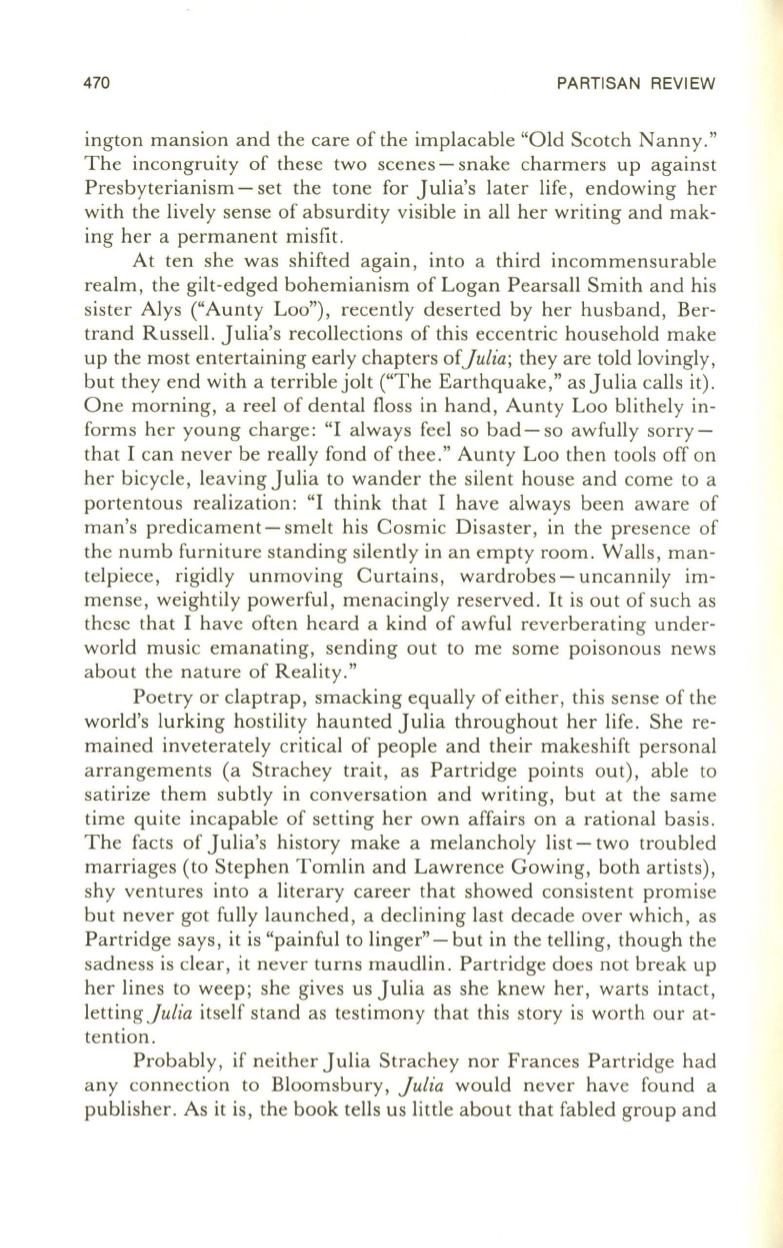
470
PARTISAN REVIEW
ington mansion and the care of the implacable "Old Scotch Nanny."
The incongruity of these two scenes - snake charmers up against
Presbyterianism - set the tone for Julia's later life, endowing her
with the lively sense of absurdity visible in all her writing and mak–
ing her a permanent misfit.
At ten she was shifted again, into a third incommensurable
realm, the gilt-edged bohemianism of Logan Pearsall Smith and his
sister Alys ("Aunty Loo") , recently deserted by her husband, Ber–
trand Russell. Julia's recollections of this eccentric household make
up the most entertaining early chapters of
Julia;
they are told lovingly,
but they end with a terrible jolt ("The Earthquake," asJulia calls it).
One morning, a reel of dental floss in hand, Aunty Loo blithely in–
forms her young charge: "I always feel so bad-so awfully sorry–
that I can never be really fond of thee." Aunty Loo then tools off on
her bicycle, leaving Julia to wander the silent house and come to a
portentous realization: "I think that I have always been aware of
man's predicament- smelt his Cosmic Disaster, in the presence of
the numb furniture standing silently in an empty room. Walls, man–
telpiece, rigidly unmoving Curtains, wardrobes - uncannily im–
mense, weightily powerful, menacingly reserved. It is out of such as
these that I have often heard a kind of awful reverberating under–
world music emanating, sending out to me some poisonous news
about the nature of Reality."
Poetry or claptrap, smacking equally of either, this sense of the
world's lurking hostility haunted Julia throughout her life. She re–
mained inveterately critical of people and their makeshift personal
arrangements (a Strachey trait, as Partridge points out), able to
satirize them subtly in conversation and writing, but at the same
time quite incapable of setting her own affairs on a rational basis.
The facts of Julia's history make a melancholy list - two troubled
marriages (to Stephen Tomlin and Lawrence Gowing, both artists),
shy ventures into a literary career that showed consistent promise
but never got fully launched, a declining last decade over which, as
Partridge says, it is "painful to linger" - but in the telling, though the
sadness is clear, it never turns maudlin. Partridge does not break up
her lines to weep; she gives us Julia as she knew her, warts intact,
letting
Julia
itself stand as testimony that this story is worth our at–
tention.
Probably, if neither Julia Strachey nor Frances Partridge had
any connection to Bloomsbury,
Julia
would never have found a
publisher. As it is, the book tells us little about that fabled group and


